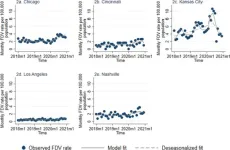(Press-News.org) uIf your boss stomps and yells, criticizes you, and then proceeds to take the credit for your work – even it is an isolated incident – it can take a profound toll on employee well-being and performance. But despite the many years of research, the precise mechanisms through which bad leadership impacts employees’ performance remain a subject of interest.
In a new study, first published online Oct. 30 in Group & Organization Management, an international group of researchers, led by Stevens Institute of Technology and University of Illinois Chicago, offer a novel explanation of the cognitive factors through which abusive leadership degrades employee performance — and helps explain why some employees are more vulnerable than others to the negative impact of abusive bosses.
“Thankfully, abusive supervision isn’t too common, but when it happens it leaves employees far less likely to take the initiative and work to improve business practices,” said Howie Xu, an author of the study and an assistant professor of management at Stevens. “We wanted to understand the cognitive factors behind that effect — and ask how companies can shield their employees from the negative impact of bad bosses.”
Xu’s team surveyed employees and supervisors from 42 different South Korean companies, along with hundreds of US students, to explore the ways in which abusive supervision impacts “taking-charge” behavior by employees. Subjects were then ranked according to whether they actively seek positive opportunities for promotion and advancement or take a more preventative approach that prioritizes safety and job security.
“We theorized that both the drive to obtain rewards (promotion, bonuses) and the drive to avoid punishments (maintain job security) would shape the way employees respond to abusive bosses,” Xu explained.
But that’s not what Xu and his team found. Rather, they found that employees who prioritize career advancement are strongly affected by abusive leadership while employees who prioritized job security remained just as likely to take charge after experiencing abusive supervision. Employees who prioritize advancement tend to hunker down and reduce taking-charge behavior after experiencing abusive supervision.”
“That’s a very surprising finding,” Xu said. “We found clear evidence that the signal from abusive leadership is much more salient to employees who care about advancement than it is to employees who care about security.”
One possible explanation, Xu explained, is that ambitious employees may perceive an abusive boss as having direct control over whether they will receive bonuses or opportunities for promotion. By contrast, bad bosses may be seen as having less direct control over firing decisions, which often require ratification by HR teams or more senior managers.
That’s an important finding, because it suggests that organizations seeking to mitigate the impact of bad leadership should focus on empowering employees and making them feel valued and appreciated, rather than simply reassuring them their jobs are safe. “If a leader slips into abusive behavior, our research suggests that they should not only apologize, but also work to reassure employees of their value to the organization,” Xu said.
Unexpectedly, the variation in employee response to abusive supervision was broadly constant across both the Korean and US populations. “We think of these countries as culturally distinct, but there was no real difference in how employees responded to abusive bosses,” Xu said. “That might reflect the effect of globalization — or might be a sign that this is a universal trait that exists across many different cultures.”
Researchers from Texas Tech University, Hunan University and Seoul National University also contributed to the paper.
END
Having a bad boss makes you a worse employee
Research underscores the hidden cost of abusive leadership, revealing that employees who prioritize career advancement suffer more than employees who prioritize job security
2023-11-01
ELSE PRESS RELEASES FROM THIS DATE:
Non-invasive technology maps brain activity to investigate behavior changes in neurological disease
2023-11-01
A research team led by Cleveland Clinic and Oregon Health and Science University (OHSU) has developed a new method for mapping how the parts of the brain "speak" to each other, critical to understanding behavior changes in patients with neurological disease.
Diseases like Alzheimer's disease change how patients communicate and act, affecting their relationships and well-being. Cleveland Clinic's Hod Dana, PhD, is collaborating with Jacob Raber, PhD, an OHSU behavioral neuroscientist, on ...
NIH funding helps Ghose Lab invest in innovative imaging equipment
2023-11-01
UTA will soon add a new piece of cutting-edge equipment to its already impressive and growing research armamentarium—a type of super-resolution microscope (SRM) that allows biologists to see structures within a cell in even finer detail.
The SRM will come to UTA because of additional grant funding from the National Institutes of Health (NIH) to the lab of Piya Ghose, an assistant professor of biology at UTA. This nearly $250,000 award supplements Ghose’s existing NIH/National Institute of General Medical ...
Domestic violence involving firearms increased during COVID-19 pandemic
2023-11-01
(SACRAMENTO, Calif.) — Domestic violence went down or stayed the same during the first 10 months of the COVID-19 pandemic in five major U.S. cities. However, domestic violence involving firearms increased in three of those cities, according to a new UC Davis study published in the Journal of Family Violence.
“The increase in firearm domestic violence is concerning, as abuser firearm access is a risk factor for lethality,” said Elizabeth Tomsich, a research data analyst at the UC Davis Violence Prevention Research Center and ...
Microbiology: River plastics may harbour potential pathogens and antimicrobial resistance genes
2023-11-01
Microbial communities growing on plastic debris in rivers may have the capacity to harbour potentially pathogenic microbes and act as reservoirs of antimicrobial resistance genes, according to a study published in Microbiome. The findings also highlight differences in the potential pathogens and antimicrobial resistance genes that new and degraded plastics may have the capacity to harbour.
Vinko Zadjelovic, Elizabeth Wellington, Joseph Christie-Oleza and colleagues characterised the microbial communities found on the surface ...
High metabolism is an early sign of Alzheimer’s disease
2023-11-01
An early phase in the process of developing Alzheimer’s disease is a metabolic increase in a part of the brain called the hippocampus, report researchers from Karolinska Institutet in a study published in Molecular Psychiatry. The discovery opens up for new potential methods of early intervention.
Alzheimer’s disease is the most common form of dementia and strikes about 20,000 people in Sweden every year. Researchers now show that a metabolic increase in the mitochondria, the cellular power ...
Trust is the most important factor for British South Asians when taking part in genetic research to tailor medications
2023-11-01
Researchers from Queen Mary University of London have gathered detailed insights from the British South Asian community that could lead to more successful implementation of genetic testing to help tailor the use of routine medications. Their findings are published today (1 November 2023) in The Pharmacogenomics Journal and indicate key issues that could affect the take up of this new type of genetic testing amongst patients.
Despite comprising 10% of the British population, individuals of South Asian heritage have historically been under-represented in ...
Cigarette style warning labels could reduce people’s meat consumption
2023-11-01
Cigarette style graphic warning labels could reduce people’s meat consumption, according to new research published today (1 November).
The study suggests the use of warning labels on meat options could improve public health and reduce the UK’s carbon footprint.
The team from Durham University tested a range of warning labels including those which warn people of the damage to climate, health, and risk of pandemics. They found that all labels were effective at discouraging people from choosing meals with meat.
All warning labels, which showed ...
New research finds that nature-based solutions are essential for Brazil to meet its 2050 net zero pledge
2023-11-01
A new study has concluded that any credible net zero pathway for Brazil must include the implementation of nature-based solutions.
Actions such as halting deforestation and large-scale restoration of native vegetation would have immediate impact, at a fraction of the cost of carbon-negative technologies.
However, stronger policy frameworks will be needed if nature-based solutions are to achieve their full potential in Brazil.
Without the implementation of nature-based solutions, in particular ending deforestation and restoring ...
New position statement supports permanent standard time
2023-10-31
DARIEN, IL – An updated position statement from the American Academy of Sleep Medicine supports the replacement of daylight saving time with permanent standard time.
It is the position of the AASM that the United States should eliminate seasonal time changes in favor of permanent standard time, which aligns best with human circadian biology. According to the statement, evidence supports the distinct benefits of standard time for health and safety, while also underscoring the potential harms that result from seasonal time changes to and from daylight saving time.
“By causing the human body ...
Reverse engineering Jackson Pollock
2023-10-31
Can a machine be trained to paint like Jackson Pollock? More specifically, can 3D-printing harness the Pollock's distinctive techniques to quickly and accurately print complex shapes?
“I wanted to know, can one replicate Jackson Pollock, and reverse engineer what he did,” said L. Mahadevan, the Lola England de Valpine Professor of Applied Mathematics at the Harvard John A. Paulson School of Engineering and Applied Sciences (SEAS), and Professor of Organismic and Evolutionary Biology, and of Physics in the Faculty of Arts and Sciences (FAS).
Mahadevan and his team combined physics and machine learning to develop a new 3D-printing ...
LAST 30 PRESS RELEASES:
Machine learning reveals Raman signatures of liquid-like ion conduction in solid electrolytes
Children’s Hospital of Philadelphia researchers emphasize benefits and risks of generative AI at different stages of childhood development
Why conversation is more like a dance than an exchange of words
With Evo 2, AI can model and design the genetic code for all domains of life
Discovery of why only some early tumors survive could help catch and treat cancer at very earliest stages
Study reveals how gut bacteria and diet can reprogram fat to burn more energy
Mayo Clinic researchers link Parkinson's-related protein to faster Alzheimer's progression in women
Trends in metabolic and bariatric surgery use during the GLP-1 receptor agonist era
Loneliness, anxiety symptoms, depressive symptoms, and suicidal ideation in the all of us dataset
A decision-support system to personalize antidepressant treatment in major depressive disorder
Thunderstorms don’t just appear out of thin air - scientists' key finding to improve forecasting
Automated CT scan analysis could fast-track clinical assessments
New UNC Charlotte study reveals how just three molecules can launch gene-silencing condensates, organizing the epigenome and controlling stem cell differentiation
Oldest known bony fish fossils uncover early vertebrate evolution
High‑performance all‑solid‑state magnesium-air rechargeable battery enabled by metal-free nanoporous graphene
Improving data science education using interest‑matched examples and hands‑on data exercises
Sparkling water helps keep minds sharp during long esports sessions
Drone LiDAR surveys of abandoned roads reveal long-term debris supply driving debris-flow hazards
UGA Bioinformatics doctoral student selected for AIBS and SURA public policy fellowship
Gut microbiome connected with heart disease precursor
Nitrous oxide, a product of fertilizer use, may harm some soil bacteria
FAU lands $4.5M US Air Force T-1A Jayhawk flight simulator
SimTac: A physics-based simulator for vision-based tactile sensing with biomorphic structures
Preparing students to deal with ‘reality shock’ in the workplace
Researchers develop beating, 3D-printed heart model for surgical practice
Black soldier fly larvae show promise for safe organic waste removal
People with COPD commonly misuse medications
How periodontitis-linked bacteria accelerate osteoporosis-like bone loss through the gut
Understanding how cells take up and use isolated ‘powerhouses’ to restore energy function
Ten-point plan to deliver climate education unveiled by experts
[Press-News.org] Having a bad boss makes you a worse employeeResearch underscores the hidden cost of abusive leadership, revealing that employees who prioritize career advancement suffer more than employees who prioritize job security



